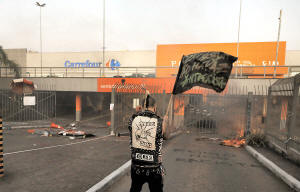Violence erupts in Brazil after Black man beaten to death at Carrefour
store
 Send a link to a friend
Send a link to a friend
 [November 21, 2020]
By Diego Vara [November 21, 2020]
By Diego Vara
PORTO ALEGRE, Brazil (Reuters) - More than
1,000 demonstrators attacked a Carrefour Brasil supermarket in the
southern Brazilian city of Porto Alegre on Friday after security guards
beat to death a Black man at the store.
The killing, which has sparked protests across Brazil, occurred late on
Thursday when a store employee called security after the man threatened
to attack her, cable news channel GloboNews said, citing the Rio Grande
do Sul state military police.
Amateur footage of the fatal beating and tributes to the Black victim
were published on social media. He was identified in local media by his
father as 40-year-old Joao Alberto Silveira Freitas.
News website G1 later reported that an initial analysis by the state
forensics institute indicated the cause of death could be asphyxiation.
In a statement on Friday, the local unit of France's Carrefour SA said
it deeply regretted what it called a brutal death and said it
immediately took steps to ensure those responsible were legally
punished.

It said it would terminate the contract with the security firm, fire the
employee in charge of the store at the time of the incident, and close
the store as a mark of respect.
In a series of tweets in Portuguese on Friday night, the Chairman and
CEO of Carrefour, Alexandre Bompard, said that the images posted on
social media were "unbearable."
"Internal measures have immediately been implemented by the Carrefour
Brazil, notably towards the security company involved. These measures do
not go far enough. My values, and the values of Carrefour do not allow
for racism and violence," Bompard said.
He called for a complete review of employee and sub-contractors'
training on security, diversity and tolerance values.
"I have asked the teams of Carrefour Brazil to fully cooperate with
judicial authorities to get to the bottom of this odious action," he
addded
In Porto Alegre, protesters on Friday afternoon handed out stickers
depicting the Carrefour logo stained with blood and called for a boycott
of the chain. They held up a banner in Portuguese reading "Black Lives
Matter" and signs calling for justice for Beto, a nickname for the
victim.
[to top of second column]
|

Demonstrators vandalize a Carrefour store during a protest against
racism, after Joao Alberto Silveira Freitas was beaten to death by
security guards at a Carrefour supermarket in Porto Alegre, Brazil,
November 20, 2020. REUTERS/Diego Vara

The protest turned violent on Friday evening as the demonstrators
smashed windows and delivery vehicles in the supermarket's parking
area. A Reuters witness saw police firing teargas at the protesters.
In Sao Paulo, dozens of protesters smashed the front windows of a
Carrefour store with rocks, pulled off the front doors and stormed
the building, spilling products into the aisles before dispersing.
In Rio de Janeiro, roughly 200 shouting protesters gathered outside
of another Carrefour store location.
Nov. 20 is honored in many parts of Brazil as Black Awareness Day.
Brazilians like to think of their country as a harmonious 'racial
democracy' and far-right President Jair Bolsonaro denies the
presence of racism. But the influence of slavery, abolished in 1899,
is still evident.
Black Brazilians are almost three times as likely to be victims of
homicide, according to 2019 government data.
"The culture of hate and racism needs to be combated at its source
and the full weight of the law should be used to punish those that
promote hate and racism," Rodrigo Maia, the speaker of Brazil's
lower house of Congress, wrote in a tweet.
(Reporting by Diego Vara in Porto Alegre, additional reporting by
Alberto Alerigi Jr, Jamie McGeever, Anthony Boadle, Rodrigo Viga
Gaier and Jake Spring; Additional reporting By Dominique Vidalon in
Paris; Editing by Howard Goller, Rosalba O'Brien and Frances Kerry)
[© 2020 Thomson Reuters. All rights
reserved.] Copyright 2020 Reuters. All rights reserved. This material may not be published,
broadcast, rewritten or redistributed.
Thompson Reuters is solely responsible for this content.
 |